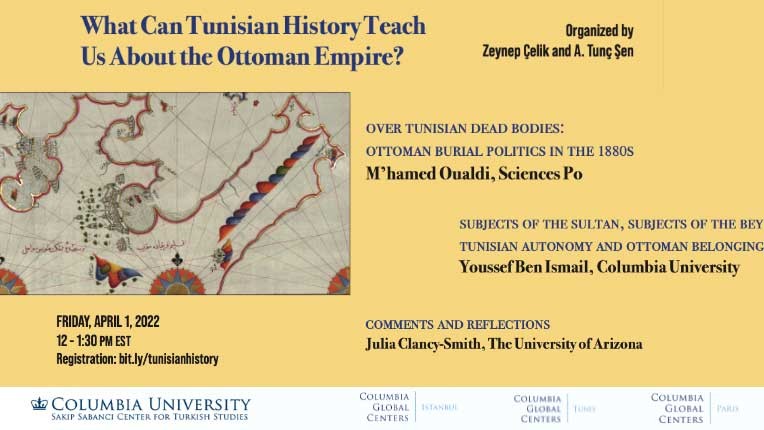What can the History of Tunisia Teach us about the History of the Ottoman Empire?
The panel answered this question: "What can Maghrib history teach us about the history of the Ottoman Empire?"

For the better part of the twentieth century, modern historiographies of the Maghrib and the Ottoman Empire have remained impervious to one another. Ottomanists rarely wrote about North Africa beyond Egypt. This lack of interest found its roots in the implicitly notion that the garp ocakları (lit. “Western provinces” – Algiers, Tunis, and Tripolitania) were not ‘real’ provinces of the empire. That they were at the empire's (administrative, geographic) periphery seemed to justify their peripheral place in the historiography. In recent years, historians of the Maghrib have begun to challenge this state of affairs. Bringing the region into the Ottoman fold, they have started to write an Ottoman history of North Africa. Taking the Ottoman autonomous province of Tunis as a case-study, this panel answered this question: "What can Maghrib history teach us about the history of the Ottoman Empire? "
Event speakers:
M’hamed Oualdi is full professor of history at Sciences Po-Paris. He is a historian of Early Modern and Modern North Africa trained in Arabic at Inalco-Paris and in history at the Sorbonne University (Paris 1-Panthéon Sorbonne) from which he obtained his PhD in 2008. Prior to joining the faculty at Sciences Po, he was associate professor at Princeton University (2013-2019) and maître de conferences at Inalco-Paris (2010-2013). His research has centered on two main topics: on slavery and its social impacts on Ottoman Tunisia and on the many effects of transitioning from the Ottoman rule to a French colonial domination in North African societies. He is the author of A Slave Between Empires: A Transimperial History of North Africa (Columbia University Press, 2020). He will be the guest of Columbia Global Centers | Tunis in May.
Youssef Ben Ismail lecturer, Middle Eastern South Asian, and African Studies, Columbia University and Fellow, Society of Fellows, SOF/Heyman, Columbia University. He is a historian of the Ottoman Mediterranean and modern North Africa. He received a PhD in Near Eastern Languages and Civilizations from Harvard University in 2021. His research deals with law and empire in the nineteenth-century Mediterranean, with a focus on the history of sovereignty in Europe and the Ottoman Empire. He is currently writing a book on the French-Ottoman imperial dispute over the sovereign status of Tunis following the conquest of Algiers in 1830. The book takes the imperial rivalry over Tunis as a case study for exploring how Ottoman and European conceptions of state sovereignty circulated, competed, and influenced one another across imperial legal traditions. Research for this project has received support from the Research Center for Anatolian Civilizations at Koç University (Istanbul) as well as from various centers at Harvard University including the Center for Middle Eastern Studies and the Center for African Studies.
Julia Clancy-Smith [Ph.D. History, UCLA, 1988] is a Tenure-Track Regent's Professor at the University of Arizona, Tucson. She is the author of Mediterraneans: North Africa and Europe in an Age of Migration, c. 1800-1900 (California UP, 2010), which won the 2011 French Colonial Historical Society Book Award and the 2011 Phi Alpha Theta History Honor Society Award for the Best Subsequent Book, and Rebel and Saint: Muslim Notables, Populist Protest, Colonial Encounters (Algeria and Tunisia, 1800-1904) (California UP, 1994), which received three book awards.